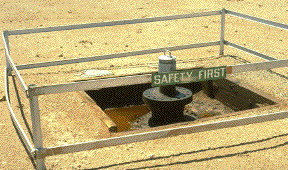
Borehole ERDA 9. Center of WIPP site
Maybe a scientific explanation is not needed. If we
think of the Delaware Basin as another kind of well-tuned clavier, then
it could have captured something also perceived by Bach. His "territory,"
after all, included the universe, and, like the Delaware Basin, his ear
was tuned to the "music of the spheres." Wasn't the Well-tempered
Clavier his attempt to tune nature? Was not his a heavenly gift?
I think the fugues of Bach and fugue of the Castile carry a lesson about
those things that we create. In a fugue, a simple beginning is transformed
into a complete composition. In the Castile, a simple response to the seasons
was propagated, over time, to became longer cycles of precession and orbital
eccentricity. In life also, our early creations, wanted or unwanted, become
the themes we repeat and elaborate. If we think of it this way, the disposal
of anything we create runs contrary to our experience. And yet, the practice
of tring to dispose of the unwanted is so ingrained within us that our lives
would change radically if we were prevented from discarding those things
we have created or acquired.

Borehole ERDA 9. Center of WIPP site
Why should our collective lives be any different from a fugue or from any process that builds and becomes more elaborate over time? Why should we be exempt from an obligation that comes with growth, and change, and evolution? If this means that we must guard our nuclear creations forever, then we should prepare to train its guardians. If this means elevating a mundane profession such as garbage disposal to a priesthood, so be it. Who knows what forms of art might emerge from such waste?